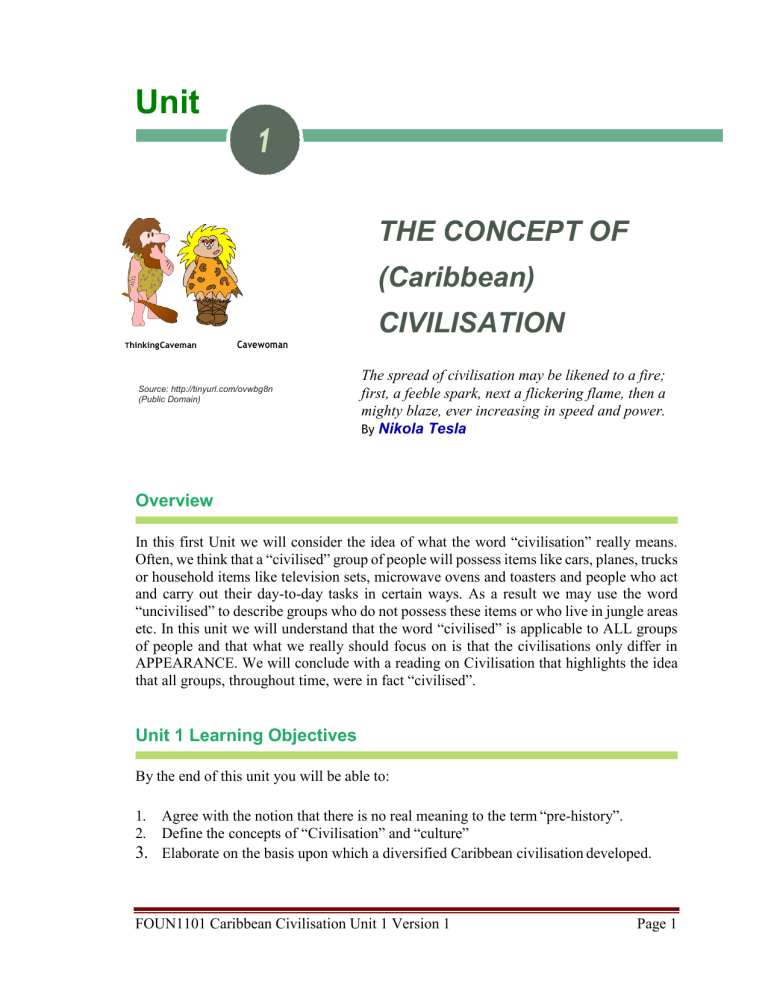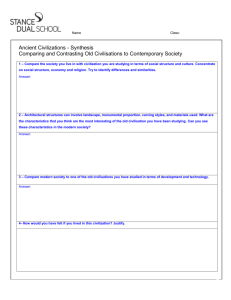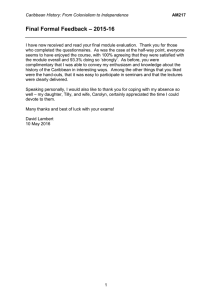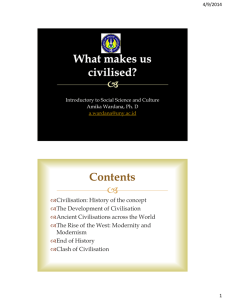
Unit 1 THE CONCEPT OF (Caribbean) CIVILISATION Thinking Caveman Cavewoman Source: http://tinyurl.com/ovwbg8n (Public Domain) The spread of civilisation may be likened to a fire; first, a feeble spark, next a flickering flame, then a mighty blaze, ever increasing in speed and power. By Nikola Tesla Overview In this first Unit we will consider the idea of what the word “civilisation” really means. Often, we think that a “civilised” group of people will possess items like cars, planes, trucks or household items like television sets, microwave ovens and toasters and people who act and carry out their day-to-day tasks in certain ways. As a result we may use the word “uncivilised” to describe groups who do not possess these items or who live in jungle areas etc. In this unit we will understand that the word “civilised” is applicable to ALL groups of people and that what we really should focus on is that the civilisations only differ in APPEARANCE. We will conclude with a reading on Civilisation that highlights the idea that all groups, throughout time, were in fact “civilised”. Unit 1 Learning Objectives By the end of this unit you will be able to: Agree with the notion that there is no real meaning to the term “pre-history”. Define the concepts of “Civilisation” and “culture” 3. Elaborate on the basis upon which a diversified Caribbean civilisation developed. 1. 2. FOUN1101 Caribbean Civilisation Unit 1 Version 1 Page 1 This unit comprises one session as follows: Session 1.1: Fundamental pillars upon which the study of Caribbean Civilisation is built. Readings & Resources Unit 1 Reading Demographic Patters Watson, D. (n.d.). Demographic Patterns - Available on course page FOUN1101 Caribbean Civilisation Unit 1 Version 1 Page 2 Session 1.1 The Myth of “pre-history” and the Basis for Caribbean Culture and Civilisation Introduction The historian David Lowenthal wrote a book called The Past is a Foreign Country. He named his book this way because he felt the past was gone. He further believed like most of us do, that the past soon becomes a distant memory and eventually fades away forever. It is this fading away that makes it distant or even unknown to later generations. It is in this sense he said the past was a foreign country. In his understanding the “faded memory” is so because it is distant to us… like a “ foreign country”. Indeed the idea of a foreign country is appropriate to use to describe the past because when we visit a foreign country we are confronted by strange/different languages, customs and even people etc. So too when we revisit the past trough books and artifacts are we confronted by these same “strange/different issues. Indeed, we often hear about past events and happenings from elders like grannies and grandpa who remember how life was when they were growing up. But these memories and experiences belong to them. We can only listen and, as such, their past becomes a different time or world or, as Lowenthal argued: "a foreign country" to where we are now and the times we live in. While interesting to note these past stories, we must also note that they relate to past incidents that occurred before many of us were even born. If we think even further back some may argue that if we go back to the time of the “cave men” then we are referring to a period before history writing even began. Those who think in this way often refer to this early time as “ Pre- history”. This session will instead show you how ALL history is valid and even if it was not recorded in the manner we know today, it is still a part of our history and as such, we should not use the term “pre history” but instead only use the term “history” to refer to the past. ... no matter how long ago it was. The Unit will also link this understanding to our subsequent study of “Caribbean Civilisation”. FOUN1101 Caribbean Civilisation Unit 1 2018 Page 3 Useful Link/Resource To access the review of a book by David Lowenthal you may read the following review of this book (Reviewed by David Glassberg) . Resource: Glassberg, D.(1987). The Past Is a Foreign Country. [Review of the book Field of Public History: Planning the Curriculum , by Lowenthal, D.]. The Public Historian, Vo. 9, No. 3, pp. 185 -187. - Available UWILinc Why Bother About the Past? Carl Becker (1953), quoted by Snyder (1972), defined the historian as someone who develops, in one way or another, the “artificial extension of social memory”. What this means is that we recover knowledge about the past through the work of historians. The “artificial” aspect of this memory emerges because we were not physically present but we learn of these events from others. This is important when studying past civilisations and especially so when we study Caribbean civilisation. We were not there. As a result we have to rely on the knowledge given to us today about the past, by historians and those who study past events. Indeed this idea is not a strange one as our society today often functions on events related to the past. FOUN1101 Caribbean Civilisation Unit 1 2018 Page 4 Source: (Public Domain) Recently two friends of mine were relating to me how they were stopped for speeding by the police and given a speeding ticket. While they were giving me the story they seemed surprised that I was smiling as they were telling me the law under which the policeman said he was giving them the speeding ticket So I explained to them that the policeman was using the historical past to charge them. They seemed confused until I explained to them that the law books were in fact collections of past events and the consequences for these past events were recorded and being used in our lives today. I further explained to them that the law books could in fact be considered as ‘history books’ as they contained events of the past that we look to today to help us guide our present day civilisation. After explaining all this we all laughed at this new understanding of the past as we made our way downtown to pay the ticket fine… \ loud laugh Carcajada Source: wxk (Public Domain) The above story is a typical example of how the past (i.e. history) is brought into our present day lives even without our realizing it. Safely then, we can say that all that ever happened and was recorded (whether written or not), is part of our history. There is then no “pre” history as that designation hints to activities outside of our memory. FOUN1101 Caribbean Civilisation Unit 1 2018 Page 5 It is clear then that aspects of our civilisation as well as past civilisations are recorded with an emphasis /respect for a particular code of conduct for living, We must note then that our classifications are usually culturally determined and so notions of ‘better’ and ’worse’ should never feature in our discussions of comparative civilisations. This point is helpful in a general academic sense and, at the personal level. The students of civilisation, through an understanding of the varied world views and value systems that underlie various civilisations, are better able to understand their own value systems and how these compare to others. This leads, ultimately to tolerance, even if not agreement, of the cultural diversity that is inherent in civilisations throughout the world and, most especially, in our Caribbean region. Please complete the weekly activity below before moving on. (Do remember to read the instructions on entries.) Instructions: Critically reflect on the course reading on “Demographic Diversity” which is provided as a main reading resource for this Unit. After reading it comment on the applicability of the following terms to the early Caribbean. You may use a dictionary to help research terms. i. A civilised society. ii. An uncivilised society. iii. A developing society. iv. An advanced society. a. What biases are implicit in each definition? Your reflection should be no more than 500 words and placed in your course portfolio. FOUN1101 Caribbean Civilisation Unit 1 2018 Page 6 The Importance of History The following are some main points that you should be aware of which support the fact that history is important for understanding past civilisations. 1. Firstly, the past is central to our sense of identity. Who we are today comes from an understanding of our origins and how we have developed over time. 2. A sense of history also provides us with familiarity with the past. This is an important attribute of history because when objects/situations are familiar they become comfortable to us. By becoming familiar with the history of the Caribbean region we become comfortable not only with the varying nationalities, ethnic groups and traditions that comprise the region but we also become comfortable with who we are, especially in the context of other world civilisations and peoples. 3. A sense of history allows us to legally validate our current actions and understandings. In a very real and practical way one sees this attribute at work, for example, in the law courts of the Caribbean region on a daily basis. In this sense, the past validates present attitudes and actions by affirming their resemblance to former ones. 4. The past is often called upon as a means of guidance. In this context, the lessons of the past are often used to direct current and future actions oftentimes based on verbal or tradition. To this end, the belief that one can ‘learn from the past’ is often championed. 5. The past is often used as an escape route from the pressures and hassles of the present. Often, many people harken back to the ‘good old days’ and reminisce on a period in time when the cost of living, crime and taxes may have been lower. Additionally, some just remember past events or periods in their lives when they believe life was simply ‘better’ or ‘more enjoyable’. This nostalgic look back is a part FOUN1101 Caribbean Civilisation Unit 1 2018 Page 7 of the human condition and we all, at some point, often briefly use this quality of the past, whether it be for a few moments or for extended periods of time. LEARNING ACTIVITY 1.1 THINKPIECE A blogger has collected and commented on two compositions by artistes from Trinidad and Tobago and Jamaica, on an aspect of the history of the Caribbean. Read and listen to the songs and the comment of the blogger. https://doglovernadine.wordpress.com/2013/04/25/a-lil-history-in-song-of-the-first-peoples-and- Using your knowledge of the issues discussed in Units 1 and 2 of this course, write your own thoughts on the assertions made. Ensure that you present a well-reasoned response which reflects not only your comments, but also the reasoning behind those perspectives. Your response should be approximately 300 words. FOUN1101 Caribbean Civilisation Unit 1 2018 Page 8 UNIT SUMMARY In this unit we established the value of an appreciation of history and the importance of both recorded and unrecorded history for recreating Caribbean Civilisation. We recognised that the term ‘pre-history’ is inappropriate, since history existed before it was possible to make lasting records, and the case for just using the term ‘history’ when studying Caribbean Civilisation was established. In attempting to define culture and civilisation and in discussing the relationship between the two, we relied on the Caribbean scholar Professor Rex Nettleford to stimulate our ideas on the topic. From his insights we realized that the need to assess each culture and civilisation on its own inherent values and merits was necessary. Finally, important links between civilisation and historical factors such as religion, literacy and oral history were introduced through the literature. FOUN1101 Caribbean Civilisation Unit 1 2018 Page 9 References Glassberg, D.(1987). The Past Is a Foreign Country. [Review of the book Field of Public History: Planning the Curriculum, by Lowenthal, D.]. The Public Historian, Vo. 9, No. 3, pp. 185 -187. - Available UWILinc Lowenthall, D. (1990). The Past is a Foreign Country. Cambridge: Cambridge University Press. Sertima, I. V. (2003). They Came Before Columbus. New York: Random House. Trouillot, M.-R. (1995). Silencing the Past. Power and the Production of History. Boston: Beacon Press. FOUN1101 Caribbean Civilisation Unit 1 2018 Page 10



